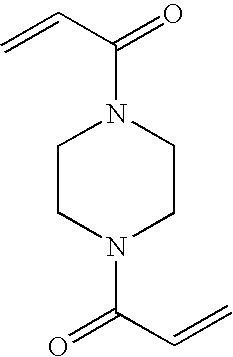Holographic Sensor
a holographic sensor and sensor technology, applied in the field of holographic sensors, can solve the problems of not being able to absorb enough light through the skin, holograms do not generally reflect light of sufficient intensity, etc., and achieve the effect of increasing the brightness and sensitivity of holographic sensors and reducing the level of unwanted effects
- Summary
- Abstract
- Description
- Claims
- Application Information
AI Technical Summary
Benefits of technology
Problems solved by technology
Method used
Image
Examples
example 1
[0029] A support medium was formed by copolymerising 12 mol % 3-aminophenylboronic acid, 86.5 mol % acrylamide, and 1.5 mol % BAP as a cross-linker. A similar medium was then formed, using 1.5 mol % MBA as the cross-linker. Silver halide was then immobilised within each medium and a hologram recorded, using 2 pulses of laser light. Another medium was formed by the “silverless double polymerisation” of 12 mol % 3-aminophenylboronic acid and acrylamide, using 1.5 mol % MBA as the cross-linker. Again, a hologram was recorded in the medium.
[0030] The hologram of the sensor of the invention was considerably (of the order of 10-100 times) brighter than that the conventional sensors, even though only 2 pulses of laser light were used in its construction. Indeed, the hologram of the invention was so bright that it could even be viewed under a strip light. The responses of the various sensors were also compared, and were shown to be virtually identical. The diffraction peak of the sensor of...
example 2
[0031] A support medium was formed by copolymerising 5 mol % acrylic acid, 90 mol % of a 2:1 ratio of acrylamide:methacrylamide, and 5 mol % BAP as a cross-linker. Silver halide was then immobilised within the medium and a hologram was recorded. The sensor exhibited similar characteristics to the sensor of Example 1.
PUM
| Property | Measurement | Unit |
|---|---|---|
| physical property | aaaaa | aaaaa |
| temperature | aaaaa | aaaaa |
| magnetism | aaaaa | aaaaa |
Abstract
Description
Claims
Application Information
 Login to View More
Login to View More - R&D
- Intellectual Property
- Life Sciences
- Materials
- Tech Scout
- Unparalleled Data Quality
- Higher Quality Content
- 60% Fewer Hallucinations
Browse by: Latest US Patents, China's latest patents, Technical Efficacy Thesaurus, Application Domain, Technology Topic, Popular Technical Reports.
© 2025 PatSnap. All rights reserved.Legal|Privacy policy|Modern Slavery Act Transparency Statement|Sitemap|About US| Contact US: help@patsnap.com

